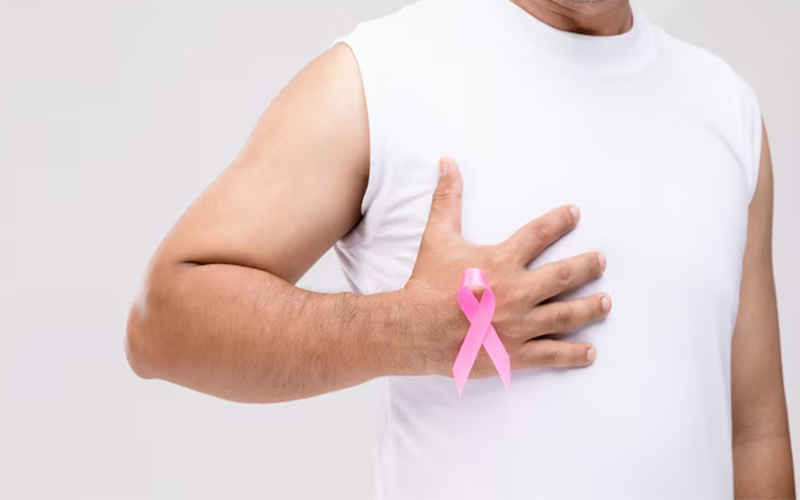
Although breast cancer is thought of as a disease that affects women, men can also develop it. Although the incidence of breast cancer in men is much lower than in women, it is still very important to increase awareness, understand the symptoms, and find the causes. Knowledge and early detection can have a huge impact on treatment and results. My Care India is regarded as the best medical tourism company in India and is revered for connecting men suffering from breast cancer with the top hospitals and surgeons in the country.
Symptoms
Although men are often diagnosed with breast cancer later than women, the symptoms of the disease can be very similar. Here are a few typical symptoms:

1. A lump or mass: A painless lump or mass in the breast tissue is the most common indication of breast cancer in males. Typically firm, this mass is hard to dislodge.
2. Skin Changes: Changes in the skin, including redness, dimpling, or puckering, might mean the cancer has spread to the skin layer.
3. Changes in Nipple: In males, the area around the nipple becomes painful; discharge besides the milk is another indication, and retraction, that is, inward movement, of the nipple is another symptom.
4. Discomfort or Swelling: Although less common, breast discomfort or swelling can also be a symptom.
5. Enlarged Lymph Nodes: If cancer has spread to nearby lymph nodes, you can feel lumps under your arm or around your collarbone.
Male Breast Cancer Causes and Risk Factors
Even though the exact cause of male breast cancer is not known, some situations may increase a man's likelihood of developing the disease. The main risk factors include the following:
1. Age: With age, the chances of developing breast cancer increase. Most cases are diagnosed in men between 60 and 70 years old.
2. Genetics and Family History: Any history of breast cancer in the immediate female relative, such as mother, sister, or daughter, may increase the risk for certain genetic mutations. These mutations increase the breast cancer risk for both males and females.
3. Hormonal Imbalance: Breast cancer can result from high estrogen levels as compared to testosterone male hormone. Two conditions that may increase the chances include obesity and illness of the liver as they alter hormone levels.
4. Klinefelter Syndrome: Men with an additional copy of the X chromosome will have the Klinefelter syndrome. Increased levels of oestrogen and decreased testosterone characterise this genetic disorder.
5. Exposure to Radiation: Males with a history of chest radiation during childhood or adolescence may also predispose the men to a higher chance of breast cancer later on.
Evaluation and Treatment
If your doctor suspects breast cancer, he or she will perform a physical examination and other imaging tests, including ultrasound or mammography, on the breast tissue. Alternatively, he or she may conduct a biopsy, where the suspicious tissue is removed and examined for cancerous cells.
Depending on the stage of the disease, male breast cancer is often treated with a combination of hormone therapy, chemotherapy, radiation therapy, and surgery. Surgery is the most common treatment, which often includes tumour removal or sometimes removal of the entire breast (mastectomy). Hormone-blocking medications may be used in some cases, especially when the malignancy is hormone receptor-positive.
Conclusion
Male breast cancer is a real and dangerous medical condition, though less common. Men can be more vigilant about seeing any issues early by being aware of the signs and risk factors. To fight this condition, one should examine oneself regularly, keep abreast of information, and seek medical help if any unusual symptoms arise. As in women, males should be aware of their breast health and take any changes cautiously. My Care India helps patients get in touch with the best treatment for male breast cancer in India, helping them get a timely diagnosis, treatment, and recovery.





